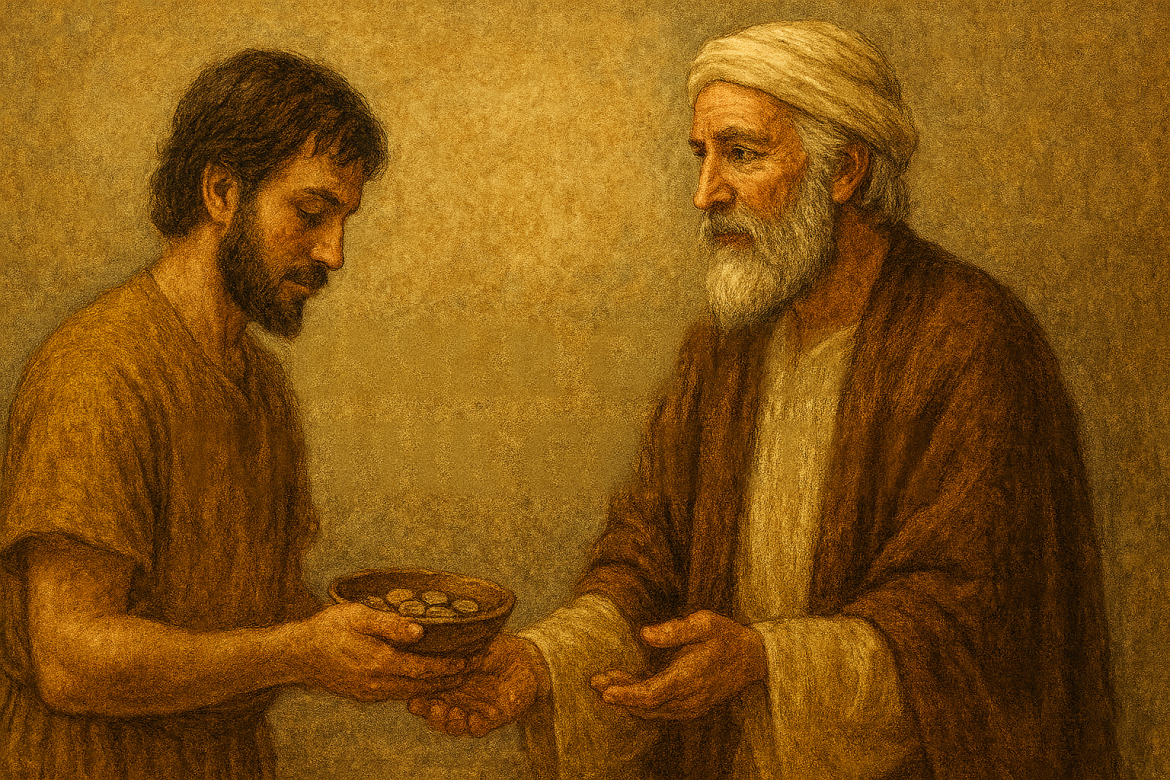Five Things We Will Learn
- How Abraham established the principle of tithing before the Law.
- Why Scripture teaches that the lesser always gives to the greater.
- How tithing differs from offerings in purpose and direction.
- What the New Testament reveals about continuing in Abraham’s faith.
- Why honoring God with our tithe is part of walking in His promise.
Abraham and the First Tithe
Before Sinai, before the tablets of stone, Abraham set the pattern.
Genesis 14:18–20 (NIV):
“Then Melchizedek king of Salem brought out bread and wine. He was priest of God Most High, and he blessed Abram, saying, ‘Blessed be Abram by God Most High, Creator of heaven and earth. And praise be to God Most High, who delivered your enemies into your hand.’ Then Abram gave him a tenth of everything.”
There was no law requiring this—only the overflow of faith. Abraham, the lesser, tithed to Melchizedek, the greater.
This is the seed of all tithing. It was not taxes, not wages, not ritual. It was honor—recognition that God had provided and that His appointed priest was the greater through whom Abraham acknowledged God’s hand.
The Law Sanctifies What the Promise Began
When the Law came, it did not invent tithing. It affirmed what Abraham had already lived.
Leviticus 27:30 (NIV):
“A tithe of everything from the land, whether grain from the soil or fruit from the trees, belongs to the Lord; it is holy to the Lord.”
Numbers 18:21 (NIV):
“I give to the Levites all the tithes in Israel as their inheritance in return for the work they do while serving at the tent of meeting.”
Deuteronomy 14:22–29 (NIV):
“Be sure to set aside a tenth of all that your fields produce each year. Eat the tithe of your grain, new wine and olive oil, and the firstborn of your herds and flocks in the presence of the Lord your God at the place he will choose as a dwelling for his Name, so that you may learn to revere the Lord your God always. But if that place is too distant and you have been blessed by the Lord your God and cannot carry your tithe … then exchange your tithe for silver, and take the silver with you and go to the place the Lord your God will choose. Use the silver to buy whatever you like: cattle, sheep, wine or other fermented drink, or anything you wish. Then you and your household shall eat there in the presence of the Lord your God and rejoice. And do not neglect the Levites living in your towns, for they have no allotment or inheritance of their own. At the end of every three years, bring all the tithes of that year’s produce and store it in your towns, so that the Levites … and the foreigners, the fatherless and the widows who live in your towns may come and eat and be satisfied, and so that the Lord your God may bless you in all the work of your hands.”
The Law sanctified what was already sacred in Abraham’s act of faith.
The Lesser Always Gives to the Greater
The book of Hebrews interprets the moment with Abraham and Melchizedek.
Hebrews 7:4–10 (NIV):
“Just think how great he was: Even the patriarch Abraham gave him a tenth of the plunder! Now the law requires the descendants of Levi who become priests to collect a tenth from the people—that is, from their fellow Israelites—even though they also are descended from Abraham. This man, however, did not trace his descent from Levi, yet he collected a tenth from Abraham and blessed him who had the promises. And without doubt the lesser is blessed by the greater. In the one case, the tenth is collected by people who die; but in the other case, by him who is declared to be living. One might even say that Levi, who collects the tenth, paid the tenth through Abraham, because when Melchizedek met Abraham, Levi was still in the body of his ancestor.”
Abraham, though the father of faith, acknowledged someone greater than himself—God’s priest. His tithe demonstrated humility and recognition of divine order.
The tithe always flows upward. It is not charity, not a gift to equals, but recognition that God places authority and blessing above us. Offerings may go anywhere—missions, needs, compassion—but the tithe belongs to the greater, to God’s order.
Related:
- New Testament Giving: The Tithe, the Promise, and the Heart of a Disciple
- Should You Tithe? Promise Before Law, Faith Afterward
- The Argument for Not Just Tithing, But for Giving All
- The Lesser Gives to the Greater: Tithing in the Faith of Abraham
- What Does Jesus Say About Tithing?
Malachi: Robbing God or Honoring Him
Centuries later, when Israel grew lax, Malachi brought God’s charge:
Malachi 3:8–10 (NIV):
“Will a mere mortal rob God? Yet you rob me. But you ask, ‘How are we robbing you?’ In tithes and offerings. You are under a curse—your whole nation—because you are robbing me. Bring the whole tithe into the storehouse, that there may be food in my house. Test me in this,” says the Lord Almighty, “and see if I will not throw open the floodgates of heaven and pour out so much blessing that there will not be room enough to store it.”
To withhold the tithe was to dishonor God. To bring it was to recognize His greatness and His promise.
Continuing in Abraham’s Faith
Paul reminds us in Galatians 3:7:
Galatians 3:7 (NIV):
“Understand, then, that those who have faith are children of Abraham.”
If we are Abraham’s children, we walk in his footsteps. That means honoring God with the tithe as he did, not out of compulsion, but out of faith.
Abraham gave as the lesser to the greater, and in Christ we follow the same pattern. We bring our tithe to those God has set in spiritual authority, who themselves honor those above them, until all honor flows to Christ, the High Priest in the order of Melchizedek.
Offerings can flow wherever love compels us. But the tithe belongs to the greater—to God, through His appointed order. To continue in Abraham’s faith is to embrace this divine principle: the lesser always gives to the greater.




